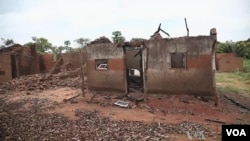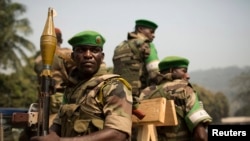GENEVA —
A new United Nations report presents an appalling picture of human rights violations in the Central African Republic, including killings, kidnappings, torture, and rape. The report by the Office of the High Commissioner for Human Rights describes events since the explosion of violence in the capital, Bangui and the northern town of Bossangoa on December 5 and 6.
U.N. fact-finders who visited the CAR last month have confirmed there were large-scale killings of Christian and Muslim civilians carried out on December 5 and 6 in Bangui and Bossangoa.
The U.N. estimates 1,000 people in Bangui alone were killed during the two days of violence.
The violence began when Christian militias, known as the anti-balaka, mounted coordinated attacks in Bangui against Muslim forces that were formerly part of the Seleka rebel alliance. The attacks prompted a series of reprisals by both sides, which spiraled into sectarian violence between Muslim and Christian civilians in the capital and elsewhere in the country.
U.N. human rights spokesman Rupert Colville says the killings continued in Bangui and elsewhere after the initial wave of attacks.
“Since the end of that first phase of intense fighting on 5-6 December, sporadic clashes continued, resulting in multiple incidents of tit-for-tat Muslim and Christian civilian killings, particularly in Bangui, but also in other parts of the country, such as Ouham and Nana-Mambere Prefectures,” he said.
Besides the killings and subsequent retaliatory attacks, the U.N. mission says it has received multiple accounts of sexual violence, torture, enforced disappearances, arbitrary arrest and detention.
The report also documents widespread looting and property destruction, including deliberate burning of civilian homes and the burning of churches and mosques.
Colville says the fact-finding team reports it has received multiple testimonies identifying certain ex-Seleka perpetrators as being Chadian nationals.
“Witnesses consistently reported that ex-Seleka, wearing the armbands of Chadian former peacekeepers, went from house to house searching for anti-Balaka, and shot and killed civilians. The team also said it received credible testimonies of collusion between some Chadian FOMAC elements and ex-Seleka.”
More than one million CAR residents have been displaced since the Seleka rebels launched an offensive in December 2012. The country has been gripped by increasing lawlessness and anarchy since the rebels seized the capital Bangui last March, forcing President Francois Bozize to flee the country.
On Friday, the CAR’s first Muslim president, Michel Djotodia, resigned under intense international pressure. Residents are hopeful the newly appointed interim government will lead the country back to peace.
But, restoring peace will take more than hope. The U.N. High Commissioner for Human Rights, Navi Pillay, says the lawlessness and human rights violations highlighted by the fact-finding mission confirm the need for urgent action and accountability.
U.N. fact-finders who visited the CAR last month have confirmed there were large-scale killings of Christian and Muslim civilians carried out on December 5 and 6 in Bangui and Bossangoa.
The U.N. estimates 1,000 people in Bangui alone were killed during the two days of violence.
The violence began when Christian militias, known as the anti-balaka, mounted coordinated attacks in Bangui against Muslim forces that were formerly part of the Seleka rebel alliance. The attacks prompted a series of reprisals by both sides, which spiraled into sectarian violence between Muslim and Christian civilians in the capital and elsewhere in the country.
U.N. human rights spokesman Rupert Colville says the killings continued in Bangui and elsewhere after the initial wave of attacks.
“Since the end of that first phase of intense fighting on 5-6 December, sporadic clashes continued, resulting in multiple incidents of tit-for-tat Muslim and Christian civilian killings, particularly in Bangui, but also in other parts of the country, such as Ouham and Nana-Mambere Prefectures,” he said.
Besides the killings and subsequent retaliatory attacks, the U.N. mission says it has received multiple accounts of sexual violence, torture, enforced disappearances, arbitrary arrest and detention.
The report also documents widespread looting and property destruction, including deliberate burning of civilian homes and the burning of churches and mosques.
Colville says the fact-finding team reports it has received multiple testimonies identifying certain ex-Seleka perpetrators as being Chadian nationals.
“Witnesses consistently reported that ex-Seleka, wearing the armbands of Chadian former peacekeepers, went from house to house searching for anti-Balaka, and shot and killed civilians. The team also said it received credible testimonies of collusion between some Chadian FOMAC elements and ex-Seleka.”
More than one million CAR residents have been displaced since the Seleka rebels launched an offensive in December 2012. The country has been gripped by increasing lawlessness and anarchy since the rebels seized the capital Bangui last March, forcing President Francois Bozize to flee the country.
On Friday, the CAR’s first Muslim president, Michel Djotodia, resigned under intense international pressure. Residents are hopeful the newly appointed interim government will lead the country back to peace.
But, restoring peace will take more than hope. The U.N. High Commissioner for Human Rights, Navi Pillay, says the lawlessness and human rights violations highlighted by the fact-finding mission confirm the need for urgent action and accountability.





